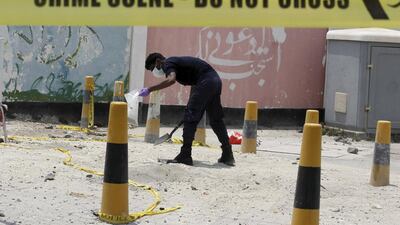The day after Iran’s foreign minister completed a three-stop tour of the Gulf, two police officers were killed in a bombing in Bahrain. Are the two incidents linked? Of course not. But is there a commonality between them? Almost certainly.
Start with Mohammad Javad Zarif, who spent the past week visiting Kuwait, Qatar and Iraq. Notably absent from that list was Saudi Arabia, the regional powerhouse, and Bahrain, where Mr Zarif would most assuredly not be welcome.
It has been widely presumed that Mr Zarif’s visits were meant to alleviate concerns by the Gulf states that Iran, emboldened by a nuclear deal with the West and flushed with billions released from its impounded foreign bank accounts, would redouble its efforts at meddling in the Middle East.
Such fears have only been exacerbated by comments from Iran’s supreme leader Ayatollah Khamenei, who pointedly said after the deal was concluded that there would be “no change” in Iran’s relations, and that the country would continue to support “oppressed people” – seen as a reference to Iran’s clandestine support for terrorism in Bahrain, among other states.
(Mr Khamenei has not only been impolitic about the Middle East – this week his official Twitter account published a bizarre mock-up of Barack Obama holding a gun to his own head.)
Last week, Bahrain arrested two men for smuggling military explosives. The men confessed to receiving the shipment from Iran. Then, on Tuesday, the two police officers were killed by a bomb using similar military explosives to those discovered with the smugglers.
Bahrain, and indeed its neighbours in the Gulf, could be forgiven for wondering if the words that really represent Iran are not the diplomatic ones Mr Zarif speaks, but the more aggressive ones attributed to Mr Khamenei.
This is the problem with Iran’s diplomacy. Rather than talking peace and seeking compromise, the country instead continues to foment problems with its neighbours. In Iraq, in Bahrain, in Syria, in Lebanon and in Yemen, the hand of Iran can be detected, and the result of its meddling in every one of those countries is more disruption, more loss of life, more instability. Iran, it appears, cannot do politics any other way.

